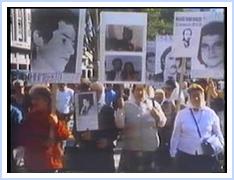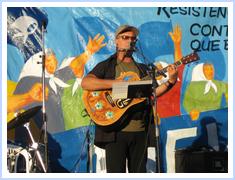On April 30, 1977 fourteen women gathered in the Plaza de Mayo across from Argentina’s presidential palace. A law prohibited groups of three or more people from gathering in public places. These women began to walk around the pyramid in the center of the plaza. They identified themselves by wearing white head scarves, symbolizing the diapers of the their children. For 29 years the mothers have held their weekly vigil in the Plaza de Mayo, to continue to demand justice for their disappeared children and defend human rights.
This past January the Mothers of Plaza de Mayo decided to conclude their annual 24-hour Resistance March, drawing to a close a chapter in the struggle for human rights. The Mothers of Plaza Mayo decided to stop marching because they say Latin Americans now have the opportunity to guide their governments. Many mothers admitted that a quarter of a century of fighting was also a factor in the decision.
Suzana Díaz is a 75-year-old mother from the northern province of Tucuman. Her son was kidnapped from the Flores Sugar Mill in 1976. The military kidnapped and murdered 14 others from the same mill. The military tagged them as dangerous for their union organizing activity. She says that the Mothers of Plaza de Mayo interpret motherhood as guiding young people fighting for a better future. "The Resistance March means a lot of things for us, we resist so those guilty for human rights abuses go to jail. Today is the last Resistance March but on Thursdays we will continue our vigils from 3:30 until 4pm. I come here to the plaza every Thursday. My children accompany me to the Marches. My son is part of all of these young people. I look at them and I see my son, they are all my children."
 After her son’s disappearance her husband lost his job due to the Sugar Mill’s closure. She came to Buenos Aires and found other mothers who didn’t know whether their children were alive or dead. For Díaz, the hardest moments made her learn the most. "I remember all of the people who stood with us. We stood firm and decided never to negotiate with the blood of our children. Our children’s blood can’t be bought or sold. We have to fight so that no other mother or father goes through what we went through. This is what we want: for them never to take away another child like they took away our sons and daughters. And for those guilty to be punished. I’m 75-years-old. I don’t know how to read or write, but everything that’s happened to me has taught me a lot. The blows in life make you learn a lot of things."
After her son’s disappearance her husband lost his job due to the Sugar Mill’s closure. She came to Buenos Aires and found other mothers who didn’t know whether their children were alive or dead. For Díaz, the hardest moments made her learn the most. "I remember all of the people who stood with us. We stood firm and decided never to negotiate with the blood of our children. Our children’s blood can’t be bought or sold. We have to fight so that no other mother or father goes through what we went through. This is what we want: for them never to take away another child like they took away our sons and daughters. And for those guilty to be punished. I’m 75-years-old. I don’t know how to read or write, but everything that’s happened to me has taught me a lot. The blows in life make you learn a lot of things."
During the Mothers’ 29 years of struggle they have endured physical attacks and endless threats. Three of the founding members were disappeared and murdered following the infiltration by Adolfo Astiz, a military officer, in 1977. Astiz, like many other former military leaders have been charged with human rights abuses. The full stop and due obedience laws implemented in the early 90’s foreclosed any successful prosecution of ex military leaders for human rights crimes by the courts.
According to Mercedes Moroño, Vice-President of the Mothers Association, the first Resistance March’s marked an important victory for the disappeared. "The resistance march means what it says, To Resist. We started this march in 1981, in the height of the dictatorship. The Mothers were the only ones who came to the plaza. No one wanted to be associated with the word resistance, because it was very dangerous at that time. But we wanted to resist. That day in this Plaza we were 70 mothers and a father who accompanied us. After that they shut off the lights in the plaza. It was completely dark and there were more than 300 military officers around us. We stayed here all night. A French journalist said…that we had won the plaza. We had won it a while ago. It was a very special moment. This march is to resist. We held the second march the following year in 1982 but the police wouldn’t let us enter the plaza. So we marched in the Avenida de Mayo. During the military dictatorship, it was the first time that anybody blocked traffic. We blocked the traffic and held the march."
The Vice President says that even after the military dictatorship ended, the Mothers fought against abuses and injustice. "We continued this protest even during democratically elected governments because they were also our enemies. Do you know why? Because they implemented the full stop and due obedience laws. There are many memories. Some that hurt the most. How I remember when they hit me the last time. We were in the Mother’s headquarters on December 20, 2001. We saw on the television a policeman dragging a kid by his hair to arrest him. And we came straight to the Plaza. What the police did that day marked me strongly."
The mothers completed their 1,500 consecutive round in a plaza enveloped in banners and photos of Argentina’s disappeared on January 26. Sara Brad, a mother from Tucuman said that the mother’s 29 years of struggle will continue in the spirit of her 30,000 children. "The Mothers were born out of our children’s fight, from their ideals and hope for a better world. We think that their struggle is more important and relevant than ever. We were able show the world what was happening in Argentina. For us that’s a very strong memory. All the solidarity we’ve created with our struggle has also impacted us."
Brad says that the Mothers have socialized their struggle and fight to solve the social problems in the nation. "This is the last Resistance March but we are going to continue each Thursday in this Plaza and the plazas of the provincial affiliates like always. Our fight will continue, in other spaces and with other projects but with the same strength. We are never going to put our arms down. The only fight that is lost is one that you give up."
 The mothers have said publicly that they will continue the legacy of demanding justice and prepare the next generation to defend human rights. They have created a popular university offering courses in human rights, popular education and community media as part of this initiative. This past year the historic human rights group inaugurated a new A.M. radio station.
The mothers have said publicly that they will continue the legacy of demanding justice and prepare the next generation to defend human rights. They have created a popular university offering courses in human rights, popular education and community media as part of this initiative. This past year the historic human rights group inaugurated a new A.M. radio station.
As the 30th anniversary of Argentina’s military junta nears, the mothers and other human rights groups are preparing a series of events to commemorate the 30,000 disappeared. The human rights group, H.I.J.O.S., has organized an escrache, or "exposure" protest for March 18, against the 1976 coup’s first dictator Jorge Rafael Videla who ruled Argentina from 1976-1981. Videla has been charged in connection with numerous human rights abuse charges, although he is only under house arrest like many other former military leaders. Leading up to March 24, groups are organizing film screenings, open debates and cultural events to prevent people’s history from being erased. March 24 this year- 30 years after Argentina’s darkest chapter -will be marked with a massive march in Buenos Aires’ center.
##
Marie Trigona is an Argentine based activist and media maker. She can be reached at [email protected] Photos are from Grupo Alavíos film, Por el Mismo Camino. For more information on Grupo Alavio, visit http://www.revolutionvideo.org/alavio/
